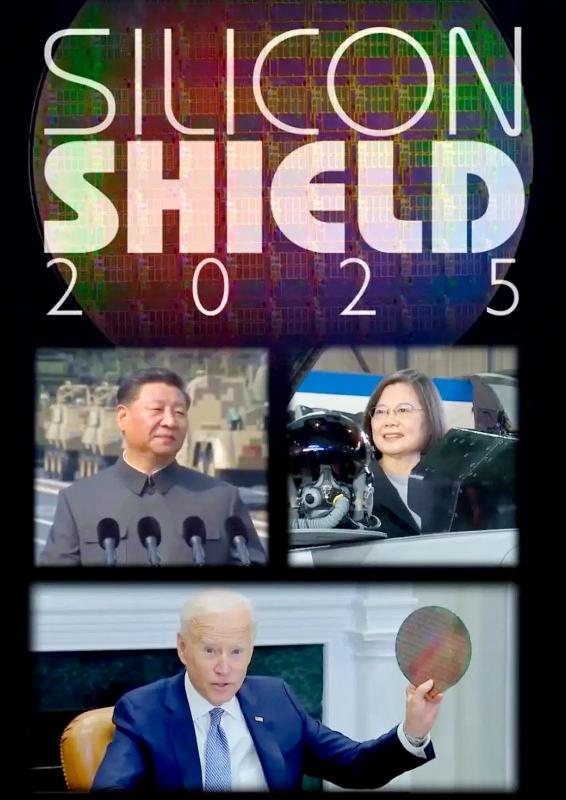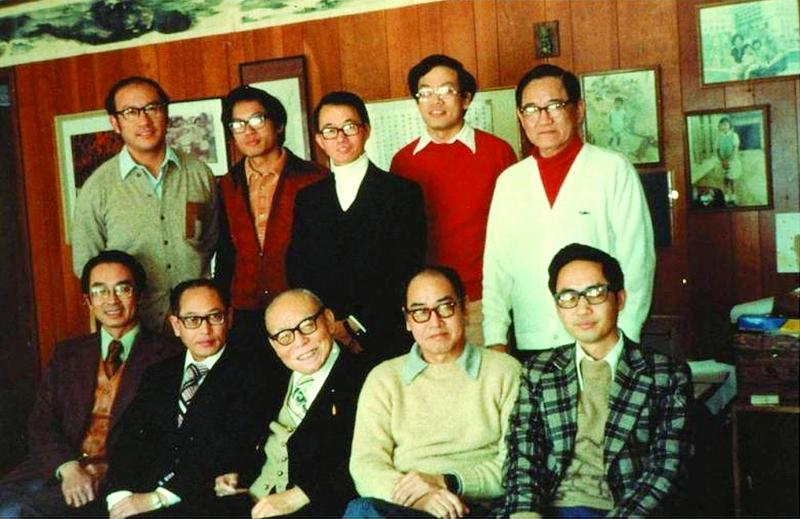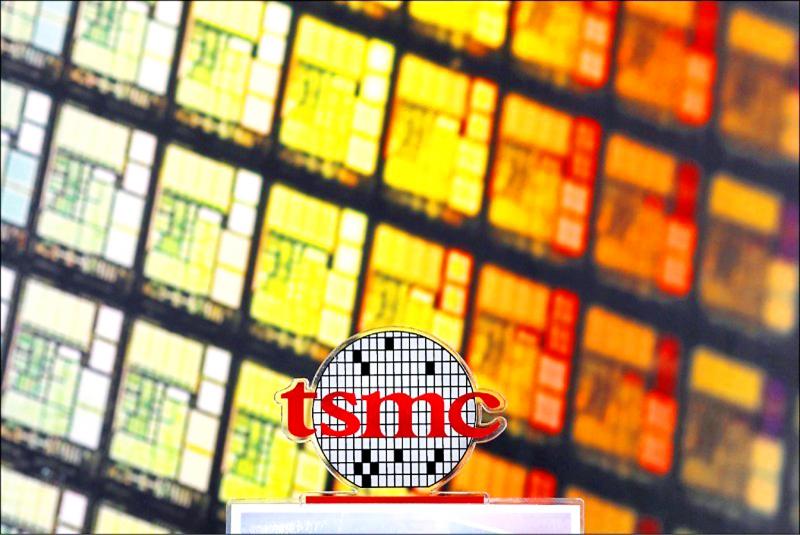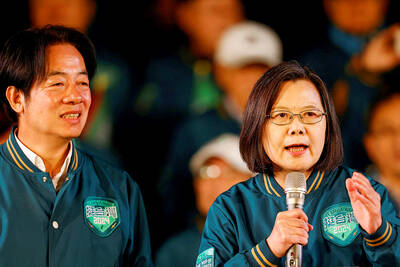More than two decades after journalist Craig Addison coined the term “Silicon Shield,” the concept remains as relevant as ever, if not even more. The idea that global — including Chinese — reliance on Taiwan’s semiconductor industry has been a major deterrent of war between the two sides of the Taiwan Strait is still frequently espoused today, especially as tensions continue to soar.
On Monday, Taiwan Semiconductor Manufacturing Co (TSMC, 台積電) chairman Mark Liu (劉德音) declared during in an interview with CNN’s Fareed Zakaria that a Chinese invasion of Taiwan would render the company’s factories “non-operable” and would create “great economic turmoil” for both countries. TSMC’s integral role in the Chinese economy is thus a deterrent rather than a risk, Liu added.
“If something happens to Taiwan, the world would suffer the consequences,” Minister of Economic Affairs Wang Mei-hua (王美花) said in response to Liu’s comments.

Addison first elaborated on the concept in his 2001 book Silicon Shield: Taiwan’s Protection Against Chinese Attack as well as the 2009 documentary, Silicon Shield: Two Chinas, One World. A lot has changed since then, but Taiwan’s unrivaled chipmaking capabilities continues to dominate the market, playing a crucial role in the global economy and as a focal point in the US-China trade war. The global semiconductor shortage amid the COVID-19 pandemic has also brought the topic to the attention of a broader international audience, making it even more important to understand Taiwan’s role in all of this.
Addison recently released a remastered and updated version of his documentary titled Silicon Shield 2025, referring to the year Taiwan’s Ministry of Defense has predicted China to have the capability to mount a full-scale assault. The documentary is still an illuminating look on how Taiwan overcame its international isolation in the 1970s and became a high-tech powerhouse, and how it was a huge gamble then that fortunately paid off big time. It also explains well the nation’s recent history and its tempestuous yet interconnected relations with its much larger neighbor.
One can question whether the silicon shield, instead of US military presence, singlehandedly prevented the 1995-1996 Taiwan Strait Crisis from escalating, as the documentary suggests, but one cannot deny the silicon shield’s significance in keeping Taiwan relevant to a world that has much to lose if the nation were to be plunged into chaos. Some questioned back then how long Taiwan’s hold on the semiconductor industry would last, but 13 years later it’s still going strong.

Photo courtesy of Industrial and Technology Research Institute
However, while still pertinent, the new film version really doesn’t feel like that much of an “update.” There is new material, including updated statistics, articles and b-roll footage, but a lot of the “current events” in the film’s latter half are still positioned as if it was still the beginning of the Ma Ying-jeou (馬英九) era.
Following Ma’s election as president, there’s a brief clip of President Tsai Ing-wen’s (蔡英文) inauguration, but it abruptly cuts out without commenting on how cross-strait relations have deteriorated since then, or how China has become increasingly powerful and fervently nationalistic, along with the rise of strongman Chinese President Xi Jinping (習近平). How has the US-China trade war changed the stakes? What exactly are the implications of the silicon shield in regards to the notion of a Chinese attack in 2025?
There’s still no insight from the Beijing end at all — it would be admittedly hard-pressed to get someone from that side to participate in the documentary, but there could be at least something from its mouthpieces such as the Global Times commenting on China’s ambitions and frustrations in penetrating this shield. For instance, it would be useful to know why their expensive “Microchip Great Leap Forward” plan hasn’t worked.

Photo: Reuters
It’s an ideal time to learn about the topic, however, as semiconductors were an important part of US House of Representatives Speaker Nancy Pelosi’s visit to Taiwan this week. For those who want a quick and informative primer to how Taiwan put itself in its current position, the documentary is well worth checking out.
The video can be streamed for US$1.99 at: vimeo.com/ondemand/siliconshield2025

Last week Joseph Nye, the well-known China scholar, wrote on the Australian Strategic Policy Institute’s website about how war over Taiwan might be averted. He noted that years ago he was on a team that met with then-president Chen Shui-bian (陳水扁), “whose previous ‘unofficial’ visit to the US had caused a crisis in which China fired missiles into the sea and the US deployed carriers off the coast of Taiwan.” Yes, that’s right, mighty Chen caused that crisis all by himself. Neither the US nor the People’s Republic of China (PRC) exercised any agency. Nye then nostalgically invoked the comical specter

April 15 to April 21 Yang Kui (楊逵) was horrified as he drove past trucks, oxcarts and trolleys loaded with coffins on his way to Tuntzechiao (屯子腳), which he heard had been completely destroyed. The friend he came to check on was safe, but most residents were suffering in the town hit the hardest by the 7.1-magnitude Hsinchu-Taichung Earthquake on April 21, 1935. It remains the deadliest in Taiwan’s recorded history, claiming around 3,300 lives and injuring nearly 12,000. The disaster completely flattened roughly 18,000 houses and damaged countless more. The social activist and

Over the course of former President Ma Ying-jeou’s (馬英九) 11-day trip to China that included a meeting with Chinese Communist Party (CCP) leader Xi Jinping (習近平) a surprising number of people commented that the former president was now “irrelevant.” Upon reflection, it became apparent that these comments were coming from pro-Taiwan, pan-green supporters and they were expressing what they hoped was the case, rather than the reality. Ma’s ideology is so pro-China (read: deep blue) and controversial that many in his own Chinese Nationalist Party (KMT) hope he retires quickly, or at least refrains from speaking on some subjects. Regardless

Approaching her mid-30s, Xiong Yidan reckons that most of her friends are on to their second or even third babies. But Xiong has more than a dozen. There is Lucky, the street dog from Bangkok who jumped into a taxi with her and never left. There is Sophie and Ben, sibling geese, who honk from morning to night. Boop and Pan, both goats, are romantically involved. Dumpling the hedgehog enjoys a belly rub from time to time. The list goes on. Xiong nurtures her brood from her 8,000 square meter farm in Chiang Dao, a mountainous district in northern Thailand’s